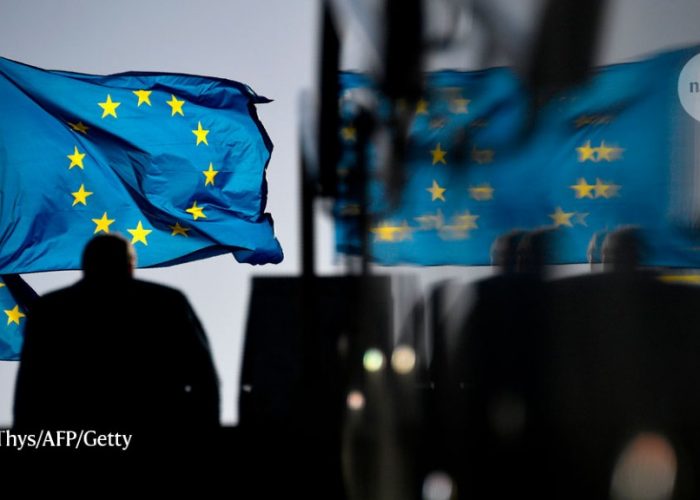European Union member states must pull back from cutting funding for the EUs top research agency.Credit: John Thys/AFP/Getty
John-Pierre Bourguignon is furious. The mathematician is interim president of the European Research Council (ERC), and is outraged by proposals that the agencys budget for 202127 is to be cut by 1.3 billion (US$1.5 billion), a reduction of almost 10% from the 14.7 billion that had been agreed by EU leaders in May. I dont understand it, he told Nature. He wants the decision reversed. So do we.
The EU has seen more than 2.5 million cases of the corona-virus, leading to the deaths of more than 142,000 people out of 925,000 worldwide. At a time like this, you would think that the continents leaders would want to strengthen the ERC, whose grant recipients are and will be key to understanding SARS-CoV-2, defeating COVID-19 and rebuilding societies and economies during and after the pandemic. But the leaders plan to cut back.
Created in 2007, the ERC is Europes main funding agency for fundamental research. It is investigator-driven, and the benefits show. Whereas politicians have been slow or late to anticipate and respond to the pandemic, 180 existing ERC projects have been found to be highly relevant to the crisis. ERC investigators are ahead of the curve.
Unexpected setback
The councils main difficulty is that its fortunes are tied to those of the EUs larger research and innovation funding programme, Horizon Europe. In previous years, both budgets had been rising. But now the pandemic is devastating economies and, with the United Kingdom no longer in the EU, its contribution will be absent.
In 2018, the European Commission proposed 94.1 billion for Horizon Europe, an increase on the 80-billion budget for the 201420 funding programme (known as Horizon 2020). But in July this year, EU leaders chopped that back to 81 billion, including a 5-billion fund for COVID-related research. As a consequence, the ERCs budget will also be cut, even though little of the extra funding is expected to flow to the type of work that the ERC supports, such as developing models to track virus transmission, researching technologies for use in diagnostics and studying human behaviour in a pandemic.
The ERCs other challenge is that returns to society from fundamental research are not always immediately obvious to policymakers particularly when compared with returns from other parts of the Horizon Europe budget, such as those that support climate science, cancer research and commercial partnerships.
Protecting funding for basic science during a time of budget cuts is monumentally difficult for any research agency, but a turbulent six months for the ERCs leadership has made it harder still.
In April, the agencys then-president, nanoscientist Mauro Ferrari, resigned after three months in office, at just the time when the agency needed to strengthen its coalition of support ahead of budget discussions. Previous president Bourguignon returned in an interim capacity on 27 July days after the crucial meeting of EU leaders at which budget cuts were proposed.
The ERC is seen as stellar by the standards of basic research agencies. According to the latest evaluation report, almost one-fifth of projects report a breakthrough and more than half lead to a major scientific advance (see go.nature.com/3iyhn9i). Some countries notably Poland have even remodelled how they award grants to mirror the ERCs approach.
About 25% of all patents filed by projects supported by Horizon 2020 have come from ERC projects, even though commercialization of research is not the agencys main aim. Bourguignon and his colleagues rightly argue that many advances in fundamental research ultimately contribute to innovation and benefit society. But that is a hard message to get across at a time of constrained funding and competing priorities.
Winds of change
The ERC has also been buffeted by Europes broader political cross-winds. During previous budget-setting periods, it was able to draw on the support of research and finance ministers from Europes three biggest economies: Germany, France and the United Kingdom. But the United Kingdom has left the EU; and Germany, for now, is unable to provide its usual strong public backing. Since July, it has held the rotating presidency of the Council of the European Union, the EU body representing member states governments. In a statement, Germanys research ministry has said that it supports the ERC but cannot take a position during budget negotiations.
Still, the ERC retains strong support from the European Parliament, from the EUs smaller countries and from research and university leaders. That is why Bourguignon is right to take his case for support directly to these constituencies, which he has been doing. But time is short: the budget will be finalized before the end of this month.
The ERC is a rare success story in multilateral research funding. Its generous starting grants have had a profound impact on the quality of research in Europe. It has helped more experienced scientists to mature as researchers and mentor new talent. That talent is needed to tackle todays crises and tomorrows, too.
For their campaign to succeed, the ERC and its supporters need the research community and politicians across Europe to make a stronger case, especially to EU member states ministries of finance. France and Germany have backed the ERC from the start. Now is not the time to dilute that support for an agency that will be essential to a postCOVID future.read more
A pandemic is no time to cut the European Research Council’s funding


